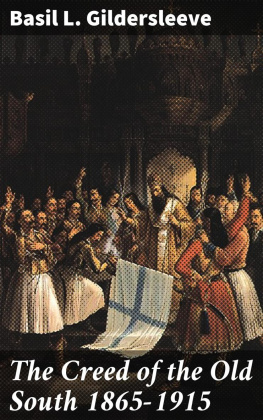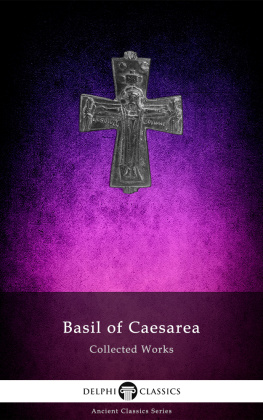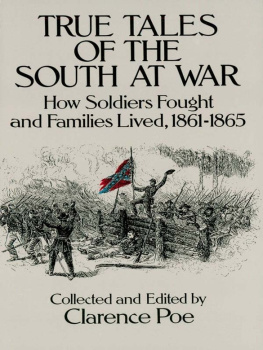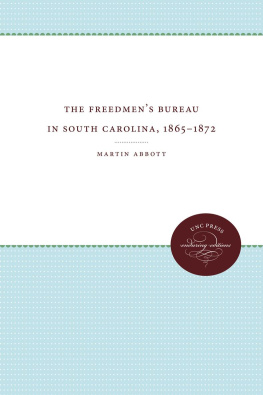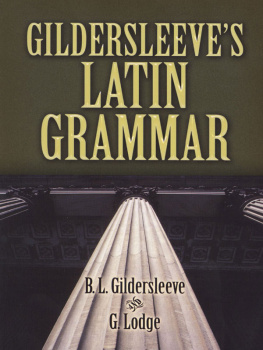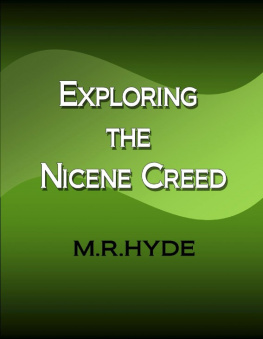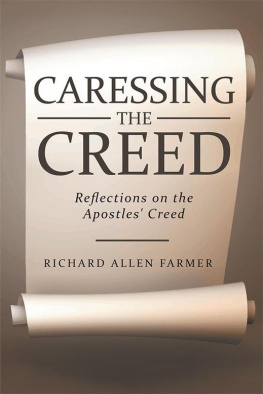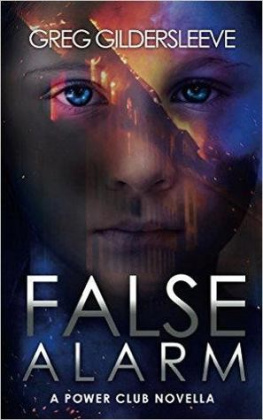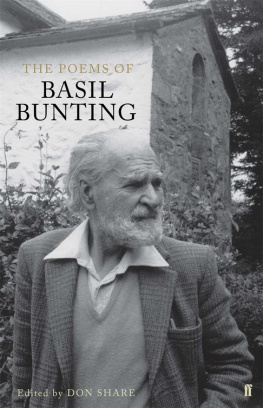PREFACE
Table of Contents
In the last score of years I have often been urged by friends and sympathizers to bring out as a separate issue my article, The Creed of the Old South, which appeared in the Atlantic Monthly of January, 1892, and which attracted wider attention than anything I have ever written. As this is the jubilee of the great year 1865, the memories of that distant time come thronging back to the actors in the momentous struggle, and I am prompted to publish in more accessible form my record of views and impressions that may seem strange even to the survivors of the conflict, now rapidly passing away. To this paper I have added an essay on a cognate themeA Southerner in the Peloponnesian Warwhich was published in the Atlantic Monthly of September, 1897, and which has been accepted by the eminent historian, Mr. Rhodes, as an historical document. These specimens of what I call my Sargasso work ("Weeds from the Atlantic") are reproduced by the kind permission of the Houghton Mifflin Company. A few slips of pen and type have been corrected, and a few notes out of the mass of literature evoked by the first essay, or akin to it, have been added for the benefit of the third generation.

The Johns Hopkins University ,
June , 1915.
THE CREED OF THE OLD SOUTH
Table of Contents
This article was prepared (in 1891) at the instance of Mr. Horace Scudder , the editor of the Atlantic Monthly, who had projected a series of papers to be written by men who by virtue of education, intellectual endowment and social position were supposed to be high and lifted up above vulgar passion and prejudice. The business of these elect gentlemen was to set forth the motives that urged them to an active participation in so rude an affair as war. After publication in the Atlantic, the essays were to be gathered into a book and Mr. Scudder fancied that thus collected they would prove a valuable addition to the history of the times. The series stopped at the third number and the book was never published. Whilst I did not concur in Mr. Scudder's view, I accepted the compliment and began to write with a lighter heart than I bore as I went on. At the end I was dipping my pen into something red, into something briny, that was not ink. The feeling seems to have been contagious, for some years afterwards (1899) Mr. William Archer , in his America Today (p. 142), wrote as follows:
"I met a scholar-soldier in the South who had given expression to the sentiment of his race and generation in an essayone might almost say an elegyso chivalrous in spirit and so fine in literary form that it moved me well-nigh to tears. Reading it at a public library, I found myself so visibly affected by it that my neighbor at the desk glanced at me in surprise, and I had to pull myself sharply together."
A few months ago, as I was leaving Baltimore for a summer sojourn on the coast of Maine, two old soldiers of the war between the States took their seats immediately behind me in the car, and began a lively conversation about the various battles in which they had faced each other more than a quarter of a century ago, when a trip to New England would have been no holiday jaunt for one of their fellow-travellers. The veterans went into the minute detail that always puts me to shame, when I think how poor an account I should give, if pressed to describe the military movements that I have happened to witness; and I may as well acknowledge at the outset that I have as little aptitude for the soldier's trade as I have for the romancer's. Single incidents I remember as if they were of yesterday. Single pictures have burned themselves into my brain. But I have no vocation to tell how fields were lost and won; and my experience of military life was too brief and desultory to be of any value to the historian of the war. For my own life that experience has been of the utmost significance, and despite the heavy price I have had to pay for my outings, despite the daily reminder of five long months of intense suffering, I have no regrets. An able-bodied young man, with a long vacation at his disposal, could not have done otherwise, and the right to teach Southern youth for nine months was earned by sharing the fortunes of their fathers and brothers at the front for three. Self-respect is everything; and it is something to have belonged in deed and in truth to an heroic generation, to have shared in a measure its perils and privations. But that heroic generation is apt to be a bore to a generation whose heroism is of a different type, and I doubt whether the young people in our car took much interest in the very audible conversation of the two veterans. Twenty-five years hence, when the survivors will be curiosities, as were Revolutionary pensioners in my childhood, there may be a renewal of interest. As it is, few of the present generation pore over The Battles and Leaders of the Civil War, and a grizzled old Confederate has been heard to declare that he intended to bequeath his copy of that valuable work to some one outside of the family, so provoked was he at the supineness of his children. And yet, for the truth's sake, all these battles must be fought over and over again, until the account is cleared, and until justice is done to the valor and skill of both sides.
I had a similar experience some years after I wrote this paper, when I was spending the summer at Westport on Lake Champlain. Wandering far enough off into the country to lose myselffor me no unfamiliar featI joined a man who was driving his cows to town and in my talk with him it turned out that he had been through the Valley campaign on the other side, and together we recalled encounters and scenes that were not recorded in the histories, insignificant skirmishessignificant enough to those who were killed and maimed. Who remembers the little brush at Weyer's Cave, where the Confederates came near bagging General Merritt? I have not been allowed to forget it these fifty years.
The two old soldiers were talking amicably enough, as all old soldiers do, but they "yarned," as all old soldiers do, and though they talked from Baltimore to Philadelphia, and from Philadelphia to New York, their conversation was lost on me, for my thoughts went back into my own past, and two pictures came up to me from the time of the war.
Apropos of this passage my friend and classmate of the Princeton days, Gen. Bradley T. Johnson , told me that one hot day riding to meet a fight that would make the day still hotter, he stopped at a roadside cabin and asked for a drink of water. The woman who brought it, brought it in a broken and cracked mug, and he assured me that every ramification of those cracks was indelibly impressed on his brain. He could have drawn a map of the mug. Experiences like these help us to understand the details of the Homeric narrative, and to me there is nothing unnatural in Homer's mention of the washing troughs that Hector saw as he fled before the face of Achilles (Il. 22, 154 foll.).
The fight under Early , to which I refer, was fought July 24, 1864. It was a brilliant feat of arms and has left other memories than those recorded. As AD C. to General Gordon I gave General Terry , one of the brigade commanders, the order to advance, and I still hear the cry of one of the men who had been in a disastrous affair a few weeks beforethe fight in which Gen. W. E. Jones fell. "This hain't no New Hope, Gineral." I still see the light of battle on the faces of the men as they went forward. My blood tingles as I write.



